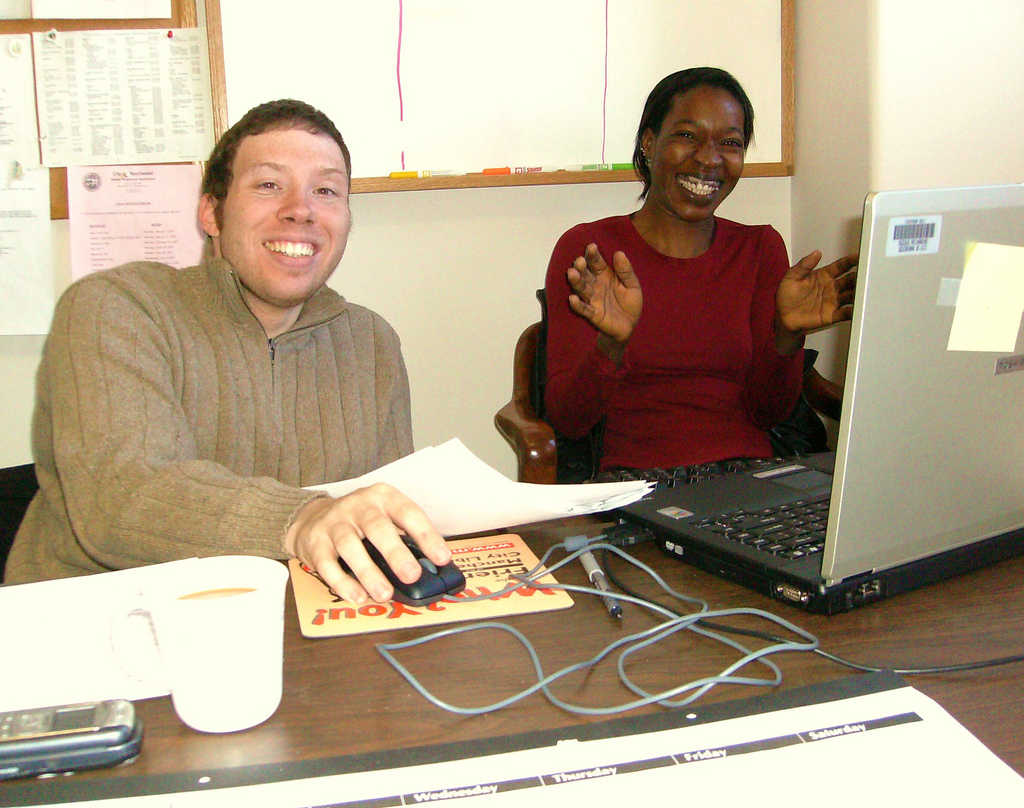
Image by Manchester City Library via Creative Commons
By Steven McGinty
As the government pushes towards ‘digital by default’, a policy which envisions most public services being delivered online, it’s worth remembering that 20% of the UK population still lack basic internet skills. Groups such as Citizens Advice Scotland (CAS) have raised concerns that ‘digital by default’ could significantly impact on vulnerable and marginalised communities, particularly those claiming welfare benefits. However, if every citizen had basic digital skills and could use online government services, it could save the public purse between £1.7 and £1.8 billion annually.
So, which groups are the most digitally excluded?
According to the UK Government’s digital inclusion strategy, digital exclusion occurs among the most disadvantaged and vulnerable groups in society. These include:
- those living in social housing (approximately 37% of those digitally-excluded live in social housing);
- those on low incomes (44% of people without basic digital skills are either on low wages or are unemployed);
- those with disabilities (54% of people who have never been online have disabilities);
- older people (69% of over 55’s are without basic digital skills);
- young people (only 27% of young people who don’t have access to the internet are in full-time employment).
What are the main barriers to using online services?
In 2013, the Carnegie Trust carried out research into internet access in Glasgow. The findings suggest that there are three common reasons why people never go online:
- the comfort of doing things offline (34% of people cited their preference for speaking to people on the telephone, or in person, as the reason they don’t go online);
- a fear of digital technology and the internet ( 28% were worried about issues such as using technology and staying safe online);
- the costs involved (20% of people highlighted pressures on incomes and the cost of internet connections).
What are the main drivers for people going online?
More recently, the Carnegie Trust carried out a new piece of research, replicating their Glasgow study in two new locations: Dumfries and Kirkcaldy. The study investigated the main reasons people choose to go online. The findings show that:
- 56% of people went online to find information of interest to them;
- 48% went online to keep in touch with friends and family;
- 44% thought it would be an interesting thing to do;
- 44% had to go online as part of their work.
How can we encourage people to go online?
Both Carnegie Trust studies show that each individual’s journey to digital inclusion is different and that a ‘personal hook’ or motivation, such as the opportunity to communicate with family members abroad, is an important tool for encouraging digital participation.
Additionally, they also show that friends and family are an important source of help when people are taking their first steps online. For instance, the case studies in Dumfries and Kirkcaldy highlight that people would appreciate help from ‘trusted intermediaries’ or local groups. Therefore, it’s important that digital participation initiatives make use of existing communities’ networks and tap into the support available from friends and families.
Wheatley Group
The Wheatley Group, which includes Scotland’s largest social landlord, the Glasgow Housing Association (GHA), has been heavily involved in addressing digital exclusion. They have developed a digital strategy to help social tenants access the internet and are committed to proving free or low cost internet access (maximum of £5 per month).
The Group has also been involved in two pilot projects: one which provides technology to 12 low-rise homes, and the Digital Demonstrator project, which tests the feasibility of low-cost broadband in multi-storey blocks. The pilot projects highlighted two important lessons:
- the role of the local Housing Officer was key for engaging with tenants
- it was important that communities and neighbours learned together.
In an ideal world, every citizen would be digitally literate, and be able to interact with government online. However, this is not the reality. The work carried out by the Carnegie Trust and the Wheatley Group provides a solid basis for developing digital initiatives and ensuring that citizens and communities are not left out.
Further reading:
- Government Digital Inclusion Strategy (Cabinet Office, 2014)
- Across the Divide: Tackling Digital Exclusion in Glasgow ( Carnegie Trust, 2013)
- Digital Participation in Dumfries and Kirkcaldy (Carnegie Trust 2015)
- Digital exclusion is a modern social evil we can abolish (Guardian, 2014)
- Voices from the frontline… Digital by default (Citizens Advice Scotland, 2014)
- When the UK goes ‘digital by default’, who will be left behind? (Guardian, 2014)
- Making Digital Real: Case Studies of How to Help the Final Fifth Get Online (Carnegie Trust, 2013)
Share
Related Posts
Supporting residents on the decarbonisation journey: leveraging data for effective retrofit projects
As the drive towards decarbonisation intensifies, the social housing sector’s ability to collect, store and manage vast amounts of data becomes increasingly critical. With a shared goal of creating warmer, carbon-free homes, housing associations’ strategic use of data is essential ....
A recent item on BBC Radio 4’s Today programme generated an unusually high number of responses from listeners. A man who had lost his job in the financial services sector at the age of 57 described his difficulty in trying ....
By Donna Gardiner While free school meals (FSM) have been available in England on a means-tested basis since 1944, recent years have seen a renewed focus upon the potential benefits of providing free school meals to all school-aged children. Currently, ....
Tackling geographical inequalities is critical for ensuring that all parts of the country have the potential to prosper. When the UK was a member of the European Union, it was entitled to a share of funding from the EU’s structural ....
